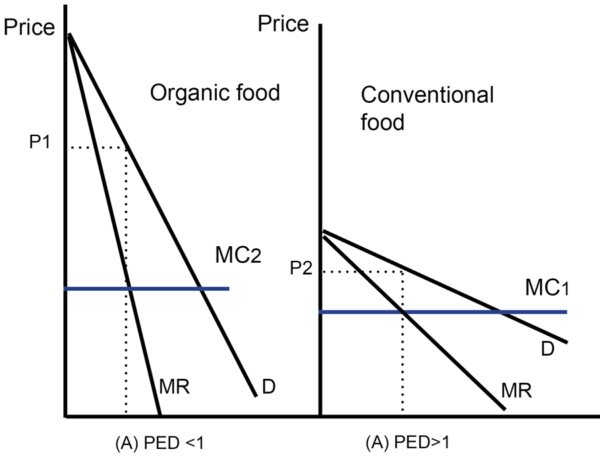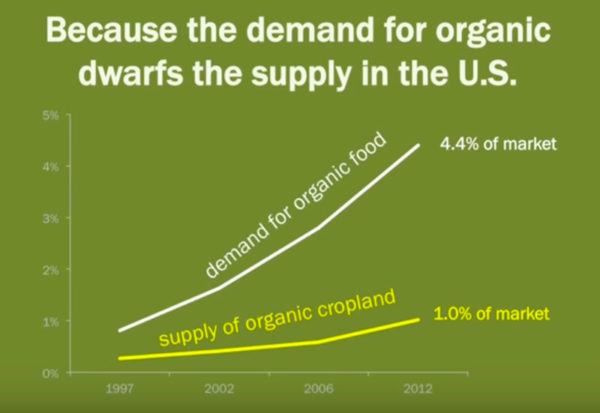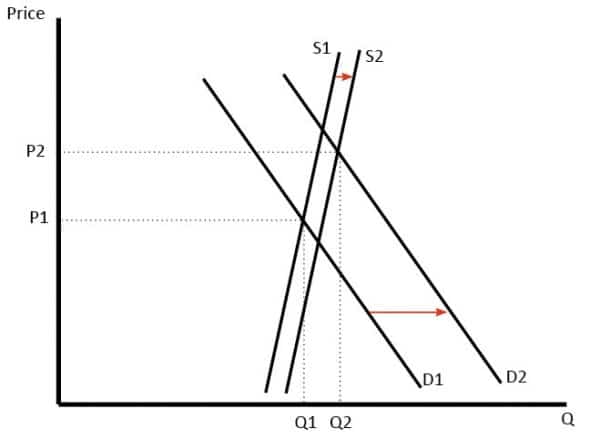Organic food is increasingly popular. In the UK, sales of organic food and drink is worth £1.96bn. But organic food still has only 1.4% share of the food and drink market (Soil Association) – with higher prices discouraging many shoppers.
Organic food also attracts a hefty premium over non-organic food. In 2016, in the US, a survey by USDA found the organic premium varied from 7% for fresh spinach to 82% for eggs. In the UK, the organic premium is higher. Shoppers pay on average an organic premium of 89%.
- Carrots and broccoli had the largest difference – with a kilo of organic carrots £1.40, compared to just 46p for non-organic.
- Organic free-range eggs had the highest premium at 112%
- Organic coffee was the lowest premium at 28%. (Food Navigators)
What are the reasons for higher prices of organic food?
- Higher costs of producing organic food
- Bigger profit-markup by retailers.
- An element of price discrimination – supermarkets charging higher prices to consumers with more inelastic demand (similar to first-class tickets)
- Demand rising faster than supply
Higher cost of producing organic food. Organic food does not allow the use of artificial fertilisers and pesticides. Therefore, farmers may have to rely on more labour-intensive methods of weed control/pest control. More crops may be lost due to disease pest, so the output is lower than conventional products.
Bigger profit margin for organics
Organic farmers often claim that the large price differentials are not matched by the price they receive. In other words, supermarkets take advantage of the organic ‘premium’ label to put a bigger markup on price. A study by French consumer association UFC-Que Choisir found that organic products were 93% more expensive in France But “Only half of the price difference between organic and non-organic food finds its way back to farmers.” (Euractiv, Sep 2017)
An element of price discrimination. It is not true price discrimination because organic food is a different product to non-organic food. But, there is an element of taking advantage of different elasticities – with supermarkets charging higher prices to those willing to buy the more expensive organic food. Those who buy organic food are more likely to have higher disposable incomes and have more inelastic demand for food. Organic food is a luxury good. As income increases, consumers are willing to spend a bigger percentage of income on organic rather than conventional.

Demand rising faster than supply
The demand for organic food is growing faster than the supply of organic food. Despite farms converting to organic production the increase in supply is less than the rapid rise in demand. One issue is that converting to organic can be a long process – three years to gain a full certificate. This can discourage farmers from making the investment when future revenues are uncertain. With demand rising faster than supply, it is to be unexpected the market mechanism will push up prices


Price differentials for organics For example, producing organic milk, cows must gain at least one-third of their food from natural grazing on grass (as opposed to industrial dairy farming where cows do not see any grass fields). The organic method may be good for animal welfare, but it does increase costs for farmers. Other organic farmers will have costs, such as higher labour costs for dealing with pests.
Differentials between different countries may also be due to different standards. In the UK the soil association require farmers to stick to natural cycles. The EU is more proactive in not just limiting the use of chemicals but encouraging organic farmers to work with natural cycles and promote sustainable organic practises. The US does not have the same regulations on pesticide residue in organics.
Fewer economies of scale.
Another possible reason is that because the organic market is only a fraction of the conventional market, there are fewer economies of scale in organic production than conventional production. this may change as organic production grows.
Evaluation
Increased availability of organics will push down prices in future
This report by AP in the US, suggests that as organic food goes mainstream, it is pushing down organic premiums.
Kroger, one of the nation’s largest grocery chains, says it stocks 9,000 organic items in its stores and notched $1 billion in organic produce sales in 2017.
AP (Jan 2019)
Whilst organic food used to be confined to specialist health stores, the increased supply of discount retailers offering organic food could lead to lower prices. Whilst supply in developed economies such as UK and US is growing at a limited rate. Supply is increasing from developing economies and Australasia, where it is proving a good investment.
Government regulation. In the UK, the government recently announced new standards for soil fertility. This may provide an advantage to organic farming which aims to promote long-term soil fertility rather than the current method of relying on fertilisers. Government subsidies could increasingly be directed to farmers who make efforts to reduce the external costs of chemicals from farms.
Related

Left out crop loss issue. Insects can devastate an organic crop quickly without the help from hard chemicals. I know I lost my organic carrots and spinach to grasshoppers in one week. Harder to farm organics.